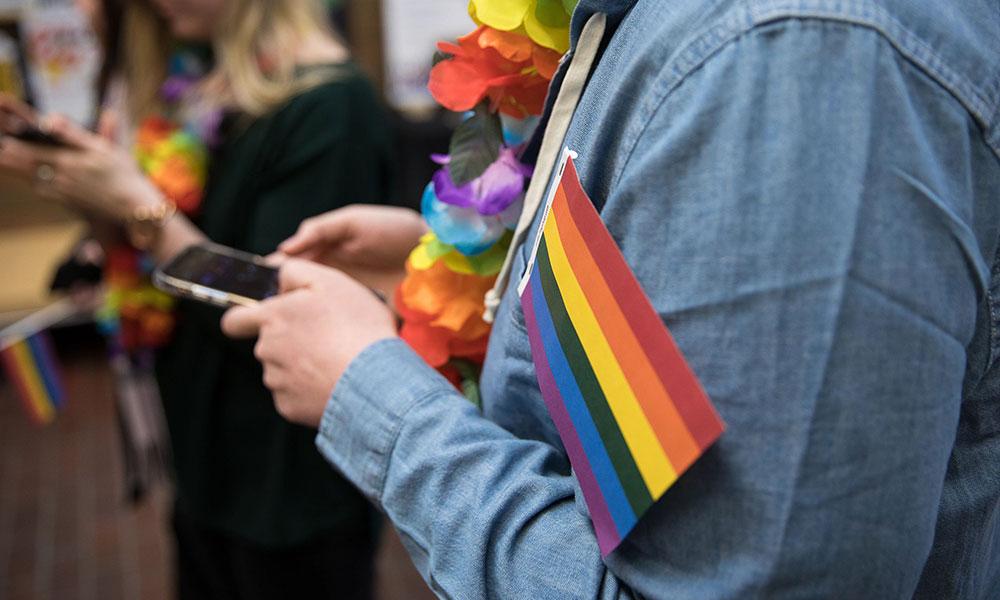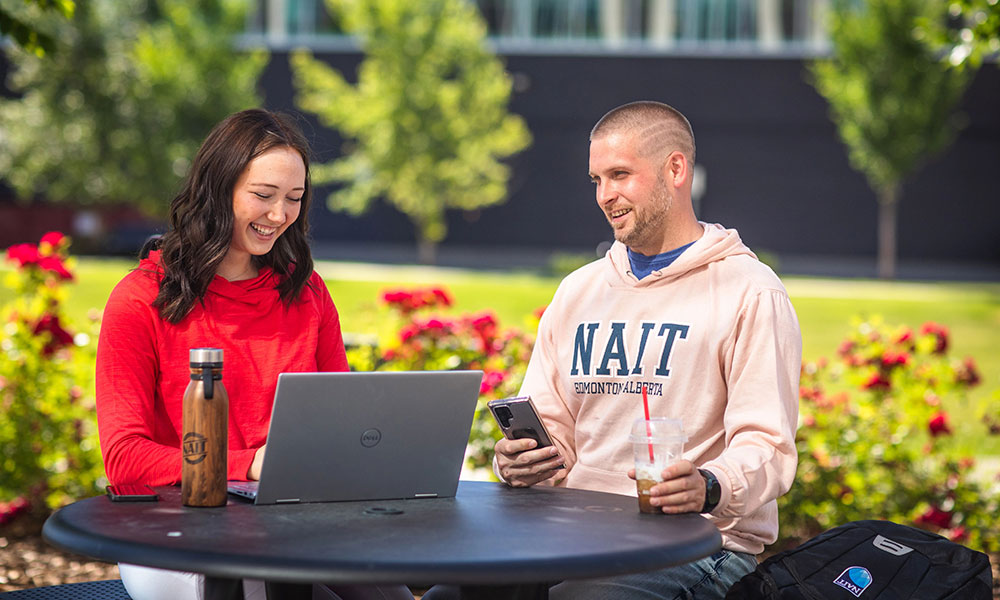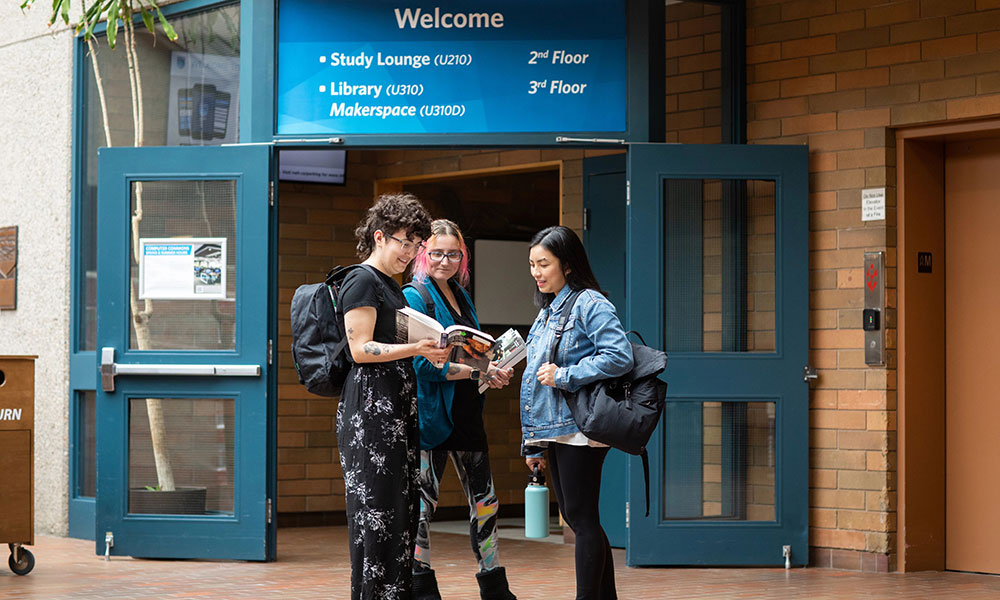Institute commits to safer campus for all, “regardless of how they identify”
Across Canadian post-secondary institutes, gender-based and sexual violence statistics are cause for alarm.
In recent years, more than 70% of students witnessed or experienced unwanted sexualized behaviours. Almost 50% saw or experienced discrimination based on gender, gender identity or sexual orientation. One in 10 women experienced sexual assault.
Those numbers were gathered by Courage to Act, a federally funded initiative to address and prevent gender-based violence on campuses across Canada. The program is the foundation of NAIT’s own work, funded by the Government of Alberta, to improve safety on its campuses, where one in three students reported experiencing gender-based and sexual violence since starting their post-secondary education.
(Across Alberta, about half of all students report the same.)
“I am committed to creating an environment where every member of our community has the opportunity to thrive, regardless of how they identify,” said Laura Jo Gunter, NAIT president and CEO, speaking on campus on Dec. 6 at a vigil for the victims of the École Polytechnique tragedy. In 1989, 14 women were killed at the Montreal school by an anti-feminist male shooter.
“NAIT has adopted seven institutional actions to address gender-based and sexual violence. These will create a campus environment that is safe and inclusive.”
To learn more about how that will happen, we talked to Daley Laing, gender-based and sexual violence (GBSV) prevention and educaton coordinator at NAIT’s office of Equity, Diversity and Inclusion.
7 actions for a safer, more inclusive campus

GBSV represents a broad category of concerns. “It’s a form of violence without someone's consent that is based on their sex, gender identity, sexual orientation or gender expression,” says Laing, who joined NAIT in June 2023.
“It [causes] harm both physical and psychological, and it can be done or threatened; it doesn't necessarily come to fruition.”
While GBSV can involve assault or worse, Laing adds, it can also emerge as purposefully misgendering someone. In some cases, it has led students to dropp out of classes.
In guiding NAIT to address GBSV, Laing drew from the 2023 survey that identified those one in three students who reported experiencing violence, as well as numerous conversations with staff. Laing looked at those findings and talks through the lens of 10 best practices recommended in Courage to Act – most of which NAIT had already some “groundwork” to achieve – and worked with other staff members to develop seven actions to help move the institute's campuses toward being free of GBSV.
1. Establish a permanent, full-time GBSV position
While it doesn’t need to be the same person going forward, says Laing, an ongoing coordinator in the role will help ensure NAIT’s commitment to, and continued focus on, creating a safer campus.
“You need a consistent position so we can be working on that long-term, sustainable work.”
2. Create an institutional GBSV action plan
“This won’t be ad hoc,” says Laing. Building an action plan will be essential to identifying outcomes and setting timelines.

3. Create and implement a comprehensive education plan
“Education is integral to prevention and response,” says Laing.
NAIT can be strategic, they add, about ensuring that the campus community knows what counts as GBSV, students know what resources are available, and staff know how to help.
4. Establish a centralized data system, including anonymous reporting
Keeping records of incidents will help gauge the effectiveness of the plan and actions over time.
“We want to be able to have those measures so that we can pivot if we need to or focus on something that is working really well,” says Laing.
5. Review and update current response processes
NAIT had policies in place to deal with GBSV before Laing began their work. But the goal going forward, they say, is to refine the process to ensure the institute consistently follows best practice with each response, is fair in each response (a legal obligation), and able to maintain confidentiality.
For example, “The person who receives the disclosure [of GBSV] is different from the person who investigates it, and from the person who adjudicates that investigation – which ensures impartiality.”

6. Establish formal supports for respondents
Though it may involve an investigation, dealing with a GBSV complaint does not equal a criminal proceeding at NAIT. It’s part of a long-term solution, says Laing, using support and education as tools to help those on either side of the complaint – including the “respondent,” or the person who may have caused the harm.
“We want to make sure that those folks have the opportunity to grow and change so that we don't have repeat [incidents].”
7. Establish a support guide network
“The goal is to disperse educated members of the NAIT community across the campuses,” says Laing. These GBSV process “champions” would be visible point persons available to answer questions and connect students and staff to resources.
Reasons for hope

Striving for a campus free of GBSV will be an ongoing endeavour, says Laing, involving work that goes deep enough to change culture.
“Gender based and sexual violence, at its core, is based on values.”
Because of this, particular groups may be targeted more than others, Laing points out. Recent statistics show, for example, that members of sexual minorities were reported to be three times more likely to be victims of violence than heterosexual Canadians.
But Laing sees potential and hope at NAIT. Having worked on similar issues at other post-secondary institutes in the past, they were encouraged by the receptiveness of the staff members they spoke with when gathering information for their report on aligning the institute with best practices.
"Every person I've engaged with has said, ‘Yes, it matters. We need to do more.’”
“This is the first time that every single person I met with and every person I've engaged with has said, ‘Yes, it matters. We need to do more,’” says Laing. Early stages of the work have left them optimistic that the institute as a whole has the best interests of its community at heart – and those of society and industry to which students and staff ultimately contribute.
As president and CEO Gunter commented during her address at the Dec. 6 vigil, “The importance of our efforts to confront gender-based and sexual violence cannot be understated.
“We must understand that our actions, policies and leadership contribute to the broader purpose of change.”